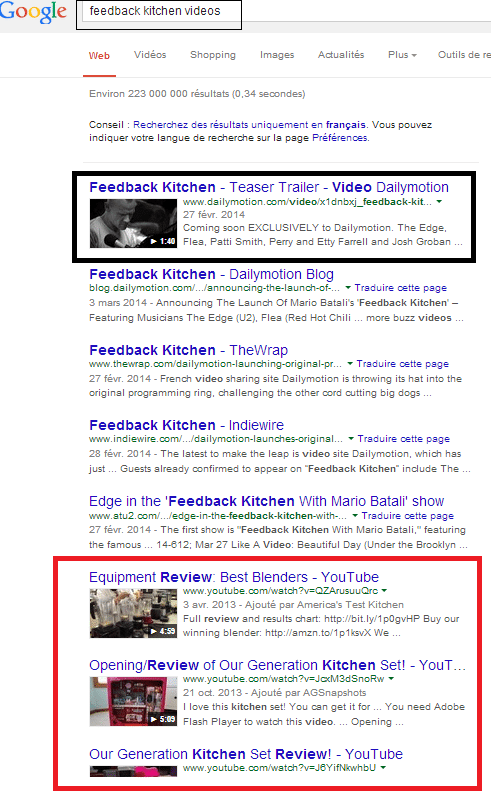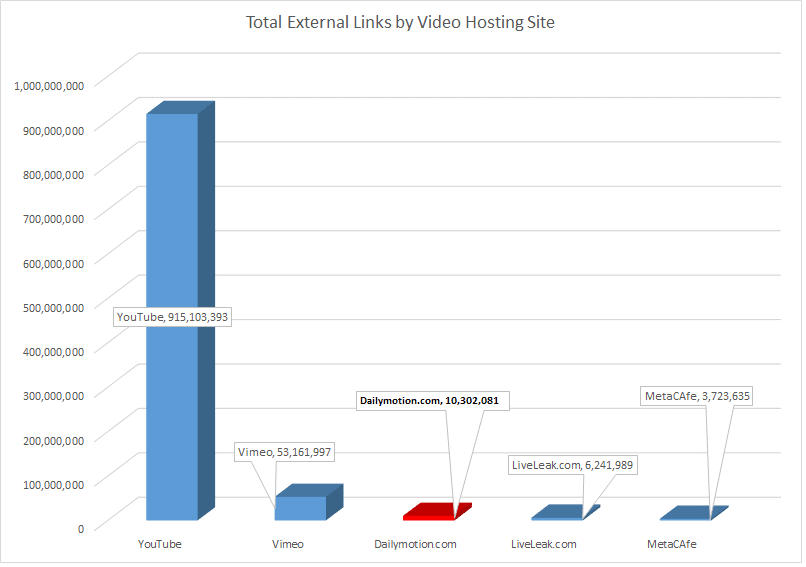Yesterday Giuseppe de Martino, the President of DailyMotion.com, told the UK newspaper The Independent that Google is cheating in search in order to promote YouTube over DailyMotion. Having been in the video hosting industry from 2006 – 2013 and knowing the complexities of the space from a digital marketing and SEO perspective as well as having experienced some very close-call anti-competitive behavior from Google, I was curious if he was right.
I immediately looked at the first thing any SEO does when a client complains that their competitors are out-ranking them and looked to see if it was deserved based on links and content. YouTube, hands down, has more links according to Moz’s Opensite Explorer. As you can see in the chart below comparing total inbound link counts for YouTube, DailyMotion, Vimeo, LiveLeak, and MetaCafe.
Based on this it’s already apparent that YouTube probably has the right to outrank DailyMotion in any serp environment. But I wanted to look at other factors too. In the video space there are 3 ways to attract more traffic: 1. Have the best overall service, 2. Provide the best niche service to a community, and 3. Create and/or encourage Original Content. At some point in their life-cycle most video hosting sites tend to pass through these three strategies. According to a press release issued by DailyMotion on February 28th, 2014 they are launching an original series called “Feedback Kitchen” this year so they are clearly hoping to gain new traffic the way that Netflix did with its series “House of Cards”. When you search for the name of this show on Google.com and Google.fr (DailyMotion is French just in case you didn’t know) no YouTube links appear on page 1 at all.
One of the complaints I had while running GamersTube was that Google would frequently insert the Video Universal at the top of queries appended with words like “videos”, “trailers”, “movie”, etc.. and the universal almost always showed YouTube videos exclusively. Today the Video Universal has been mostly integrated into Google’s SERPs showing video thumbnails inline with normal results, but the behavior of showing more videos when those trigger words are added has not changed. When the word “videos” is added to the query “Feedback Kitchen” in both Google.com and Google.fr YouTube does show up at the bottom of page 1 with irrelevant results, but DailyMotion is at the top for the queries. This might be DailyMotion’s complaint, they’ve clearly gone out of their way to NOT use YouTube in marketing their own video series, yet adding a word like “videos” to the query seems to pull in unrelated videos from YouTube pushing down relevant news and other results related to the show.

Next I wanted to look at DailyMotion’s SEO state as it pertains to on-page. For this I wanted to compare a query that might be typed by the more European audience they draw in, “Real Madrid vs. Bayern Munchen”. Right now, it might change by the time you read this, this phrase is a major part of several videos DailyMotion is suggesting to me on their homepage. So if anything these should be ranking well for the video site in Google (if it’s a static push and not personalization, I hate soccer so it shouldn’t be…). This query did not return videos on page 1 of Google.com or Google.fr from YouTube, DailyMotion or other sites. Appending “videos” to the query did reveal videos in both engines on Page 1. In Google.fr 3 video sites are shown in order, p3-last-video.com, p9-dailymotion.com, p10-youtube.com. In Google.com 2 video sites are shown in order, p6-youtube.com, p7-footytube.com. Videos are often non-unique, meaning, like images they tend to get spread around the internet so YouTube and DailyMotion hosting the same video or very related videos from a soccer/football match is not surprising at all. YouTube, also probably not surprising, has more comments on their video for this query (420) compared to DailyMotion (0), not that this has anything to do with the rankings but I know inevitably someone will bring it up.
This is just one example, but in this one Google seems to do a good job in showing a variety of video sites, something that honestly surprised me, and not promoting YouTube over other sites. But after reading the comments on the SearchEngineLand article I wanted to try a few more searches. I checked searches for “Hobbit 2 Trailer”, “Titanfall Videos”, “Titanfall Trailers”, and “How to Cook Bacon Videos” using mostly Google.com and some Google.fr.
I did more searches on Google.com but Google.fr had interesting results too. Perform these searches yourself as some of it might be different (searches all done in chrome’s incognito mode).
Google.com: “Hobbit 2 Trailer”
6 videos
p1 – youtube.com
p2 – youtube.com
p3 – youtube.com
p4 – imdb.com
p6 – imdb.com
p8 – telegraph.co.uk
Google.com: “Titanfall Videos”
6 videos
p1 – youtube.com
p3 – ign.com
p4 – ign.com
p5 – gamespot.com
p7 – gametrailers.com
p8 – gametrailers.com
Google.com: “Titanlfall Trailers”
7 videos
p1 – youtube.com
p4 – gamespot.com
p5 – gamespot.com
p6 – gamespot.com
p7 – ign.com
p8 – ign.com
p9 – ign.com
Google.com: “How to Cook Bacon Videos”
7 videos
p1 – youtube.com
p2 – youtube.com
p3 – allrecipes.com
p4 – chow.com
p5 – video.about.com
p9 – bhg.com
p10 – cookinglight.com
Google.fr: “Hobbit 2 Trailer”
5 videos
p1 – youtube.com
p2 – youtube.com
p4 – telegraph.co.uk
p5 – imdb.com
p8 – dailymotion.com (french language)
As you can see from the above results, it seems Google has a domain clustering problem when videos are integrated into the SERPs. Typically we see YouTube in the top few spots but also other sites like IGN, IMDB, GameTrailers, and GameSpot appear to get clustered when the query specifically denotes a video, even though there are clearly other video options out there or non-video universal links that are in-fact video pages.
This part is not so-surprising. Ever since around late 2010 / early 2011 the Universal has been dominated by clusters of YouTube and other major media video sites with YouTube almost always at the top.
Finally I wanted to look at how DailyMotion handles video embeds to see if there were any problems there that might be adversely affecting them. Back in 2011(ish) YouTube rolled out a new way to embed videos. No longer would they use the 5-6 year old standard flash video embed code, but with the rise of HTML-5 they devised a new one using an old HTML code that had fallen into disuse, the iframe. YouTube’s strategy was cutting edge and reeked of having been informed by Google’s internal search team. A user who wants to embed a video copies a short piece of HTML embed code which leads to a page where the video is in fullscreen in the browser. This allows the iframe to pull in the video without interruption. The embed video page hosts a line of code known as rel canonical that tells search engines that this is not the right page for the source video, but to assign all credibility to the actual video page most users find via a search engine. Then about a year later some research came to light by SEO Michael Martinez that showed that Google was now passing “link juice” through the iframe element. This research was backed up by a second study performed by Jody O’Donnell of the Rimm-Kaufman Group effectively proving that Google was passing link value on to the page that was placed in the iframe. For YouTube this become a huge coup, make it the default way to embed your video content on a blog and pass the link juice on to your main page and Boom! huge SEO boost. Other video websites had resorted to placing a link below their flash embed code back to the main page for the video, something Google stated several times that it frowned upon.
Now a few years later and most video sites are switching to this same tactic of embedding videos on other sites, following the exact same process (except MetaCafe which seems to not want to add the rel canonical to their embed page). That includes DailyMotion, but old habits die hard and DailyMotion still tags the bottom of their embed code with a link back to the main video page as well as a link back to the video uploader’s profile.
I was curious though. If link juice flows via iframe’s as the 2 tests above discovered, and the rel canonical is meant to reassign the credit for a link to its original page, is YouTube getting treated differently here than DailyMotion? The answer is not just yes, but holy mother of God yes. Both DailyMotion and YouTube use a sub-diretory to house all video pages meant fo the embed code. According to Google’s own engine counting how many responses it found to a query, DailyMotion has over 15 million urls that are stuck in the /embed directory but YouTube? just 635,000.
YouTube has over 5.5 billion urls that are likely videos according to Google’s engine, DailyMotion just 8.6 million. So out of YouTube’s billions of videos that use this same embed code strategy with canonical URLs only 0.01% are indexed as an embed code and not the page YouTube tells Google to index, DailyMotion? 177% MORE urls than Google indexes as the actual video page. Could this be causing an imbalance? If the research on iframes passing linkjuice is correct and Google is still following their own definition of a canonical stating that one of its purposes is to “consolidate link signals” then yes, this could be causing a major issue for DailyMotion. Is it being done on purpose? that is unclear. But what is clear is that a few years ago Google seems to have definitely given one of their subsidiary destination sites exclusive information to help them dominate a new part of Google and exploit a change.
Recap: Ways Google Could be Cheating DailyMotion to Favor YouTube:
- Ranking YouTube at the top of Video Universal (note: this is not manual, so doubtful this is a ‘cheat’)
- Domain clustering in video blended results seems to favor YouTube with the top few links in a large percentage of queries where video terms are used.
- Not counting DailyMotion’s rel=canonical tags on their embed pages
- Including unrelated videos from YouTube in queries about DailyMotion’s original show “Feedback Kitchen”
Warning Personal Opinion Ahead: DailyMotion has been around a long time, but hasn’t seemed to innovate the space or done anything interesting or great for the world of video hosting or its users. In fact while watching a video on their site an ad started playing with audio that was loud and made me close my browser, their comments section is devoid of activity, and the pages look and feel cluttered and messy. If they want to overtake YouTube they need to foster a culture of innovation, create new tools, and hire a better marketing / seo department. I’ve been a vocal advocate against YouTube since their seedy inception stealing video content. The platform started terrible and remains terrible with bad copyright takedown rules, forced google+ adoption, and other things that make it less than desirable. But at least they are trying to be innovative, that’s more than most other video hosts. DailyMotion and other video platforms have a great opportunity, crying and whining won’t get them to the point where they deserve to be shown before YouTube in search results, only hard work and innovation will. That’s probably how Google is best cheating DailyMotion, with better developers, marketing, and user experience, even with the SEO issue and likely internal discussions uncovered above. SEO is an important part of your business but it shouldn’t be your only focus. Get to it DailyMotion, I hope to see lots of interesting things coming.

